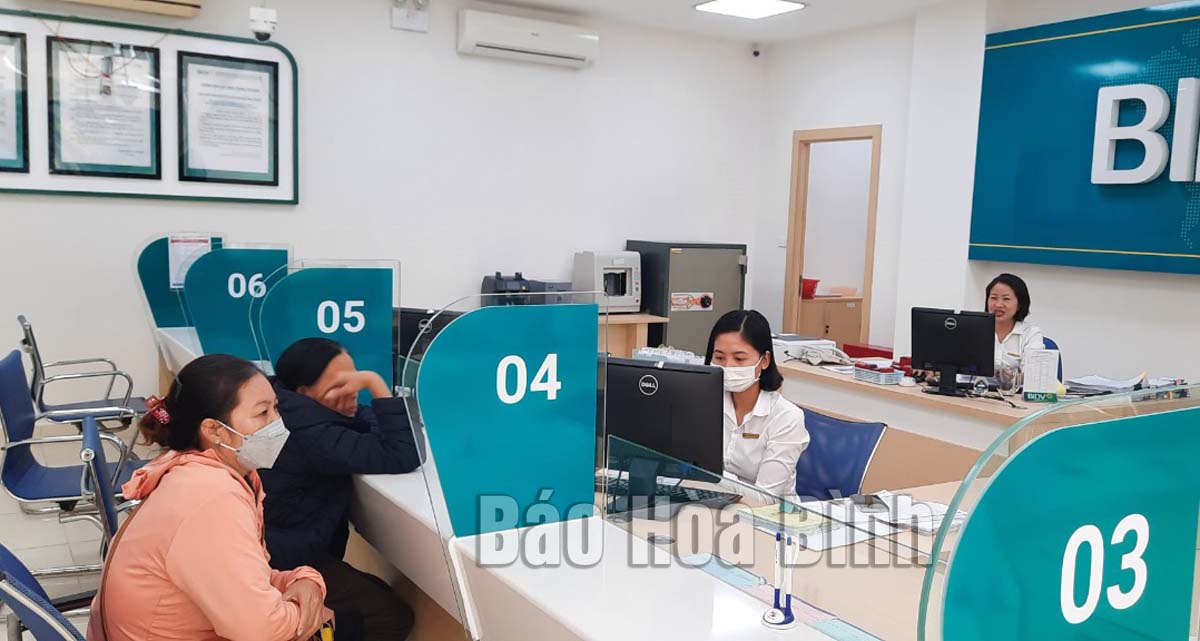
(HBO) - On March 27, 2017, the Standing Board of the Party Committee of the provincial Agencies’ Bloc issued Resolution No. 08-NQ/DU on reforming the ideological work, and preventing self-evolution and self-transformation among the Party members, focusing on leading and directing Party organisations, officials and members to seriously implement it, thus creating changes in political thought, morality, lifestyle, attitude, and responsibility to set example of officials and Party members, according to Nguyen Duc Cuong, Secretary of the Party Committee of the provincial Agencies’ Bloc.

Over the past years, Party organisations in the
banking sector have focused on leading the units to improve the quality of
serving businesses and people. (Photo taken at BIDV Hoa Binh).
As of August 2022, the Bloc Party Committee had 73 Party
grassroots organisations (including 46 Party organisations and 27 cells) with
4,240 members. After promulgating the resolution, the Bloc Party Committee and
the Party committees have led and directed the implementation of the resolution
in association with realising documents of the Party Central Committee and
provincial Party Committee on building and rectifying the Party and promoting
the learning and following of President Ho Chi Minh's ideology, morality and
lifestyle.
The Bloc Party Committee and its subordinates have
introduced the contents of learning, raising awareness, fighting, and repelling
the degradation of political ideology, morality, lifestyle, and expressions of
self-evolution and self-transformation to the activities of the Party Committee
and Party cells; and strictly implemented the principle of self-criticism and
criticism in committees and cells at all levels.
After five years implementing the resolution, activities of
Party committees have been increasingly innovative and effective.
Socio-political organisations have reported many positive changes. The
pioneering role, and responsibility of setting an example of officials and
Party members, and the level of political theory have been enhanced, thus
creating positive changes in the fields of politics, ideology, morality,
lifestyle, and behaviour./.
The Standing Board of the Hoa Binh provincial Party Committee has agreed in principle on a proposal by the Standing Board of the Party Committee of Hoa Binh city to gather feedback on the city’s 1:2000 zoning plan, which forms part of its broader urban development strategy.
Hoa Binh province has made notable progress in public administration reform and digital government development, with the satisfaction index among citizens and businesses reaching over 84%, according to recent government evaluations.
Thanks to great efforts by local authorities in recent times, the governance and public administration performance of Mai Chau district has been significantly improved.
In the afternoon of June 6, the Party Committee, the People's Council, the People's Committee and the Fatherland Front of Lac Son district solemnly held a meeting to celebrate the 139th anniversary of the district's founding (1886–2025) and the 79th anniversary of the establishment of the district's Party Committee (1946–2025). There was the attendance of Mr. Bui Van Thang, the Vice Chairman of the Provincial People's Council; Mr. Quach Tat Liem, the Vice Chairman of the Provincial People's Committee; Ms. Dang Bich Ngoc, the Deputy Head of the National Assembly Delegation of the province; as well as the former leaders of the province and district through various periods, who are the natives of the district.
Implementing the Politburo’s Resolution No. 57-NQ/TW on breakthroughs in science – technology, innovation, and digital transformation is a golden opportunity for the northern mountainous province of Hoa Binh to renew growth model, improve competitive edge and shorten digital gap.
Resolution 57-NQ/TW, issued by the Politburo on December 22, 2024, identifies sci-tech, innovation, and digital transformation as strategic breakthroughs to build a developed and prosperous nation. In Hoa Binh province, this spirit is not just a slogan, it’s being put into action through concrete initiatives that form a "new development triangle”: digital citizenship, digital economy, and digital administration.



